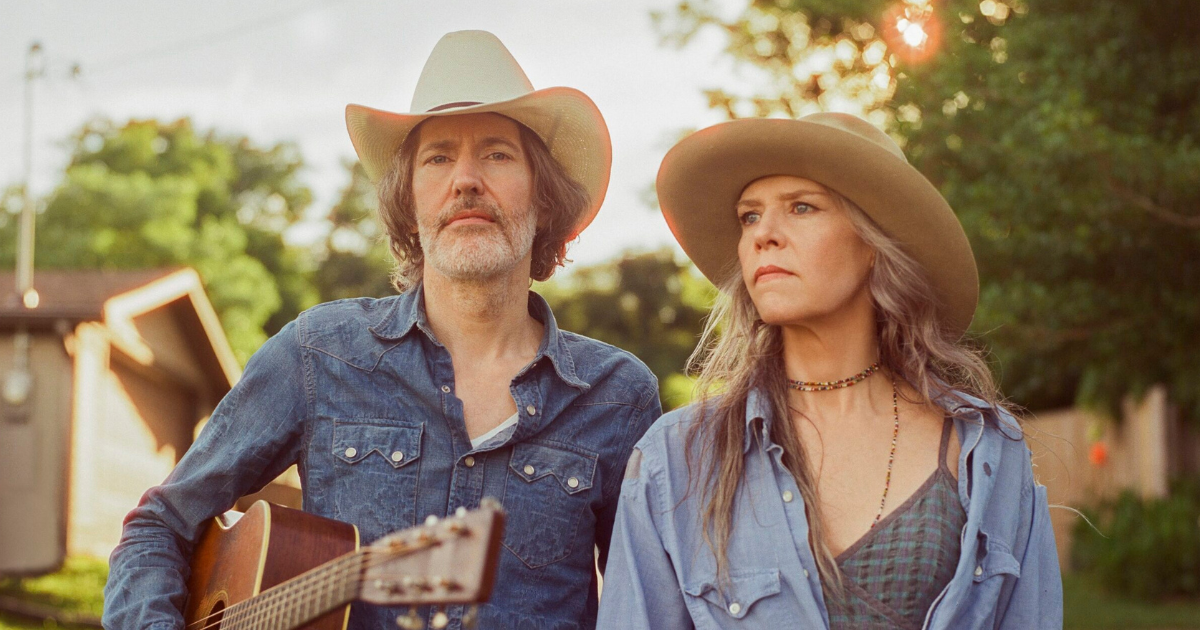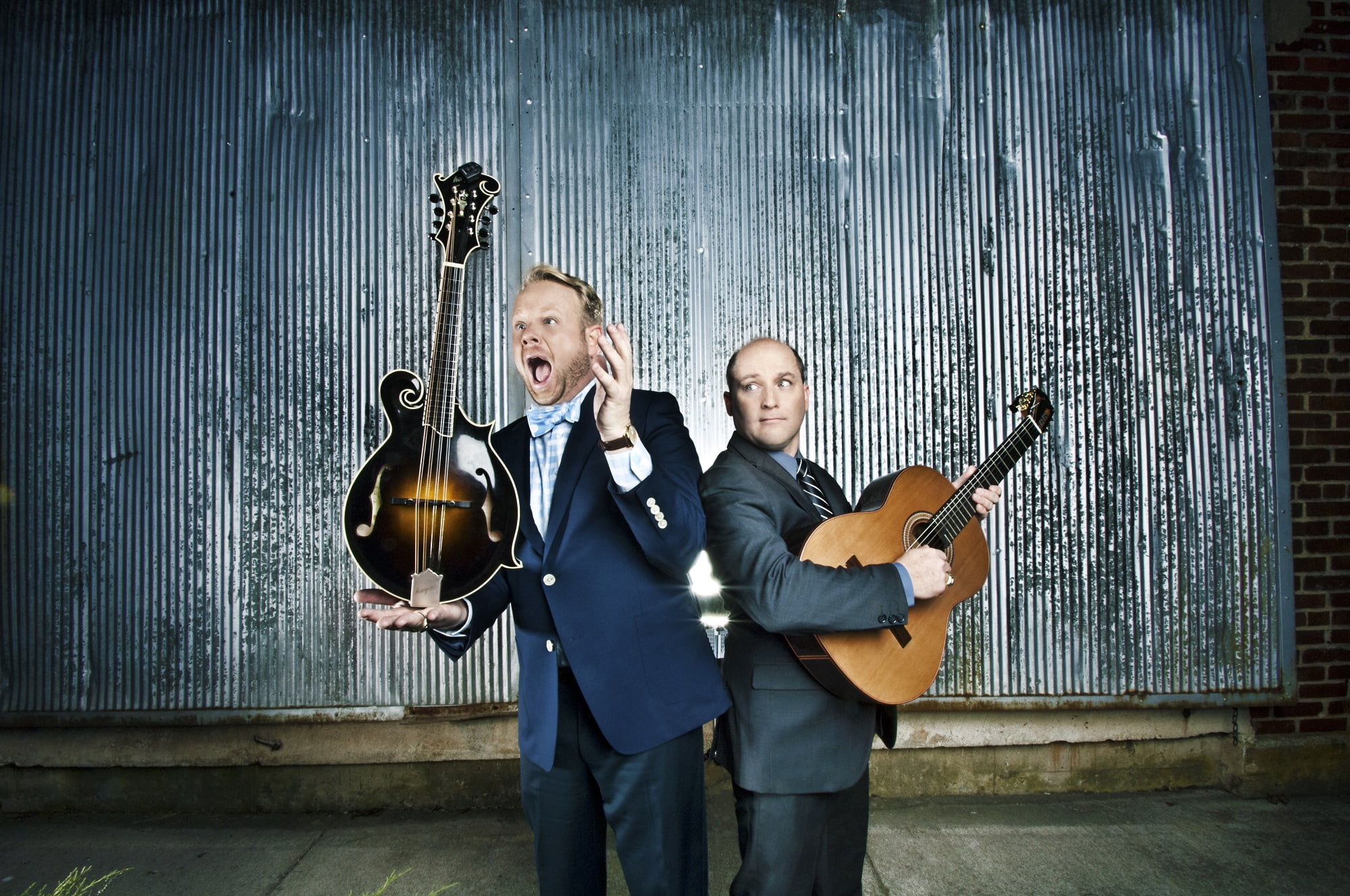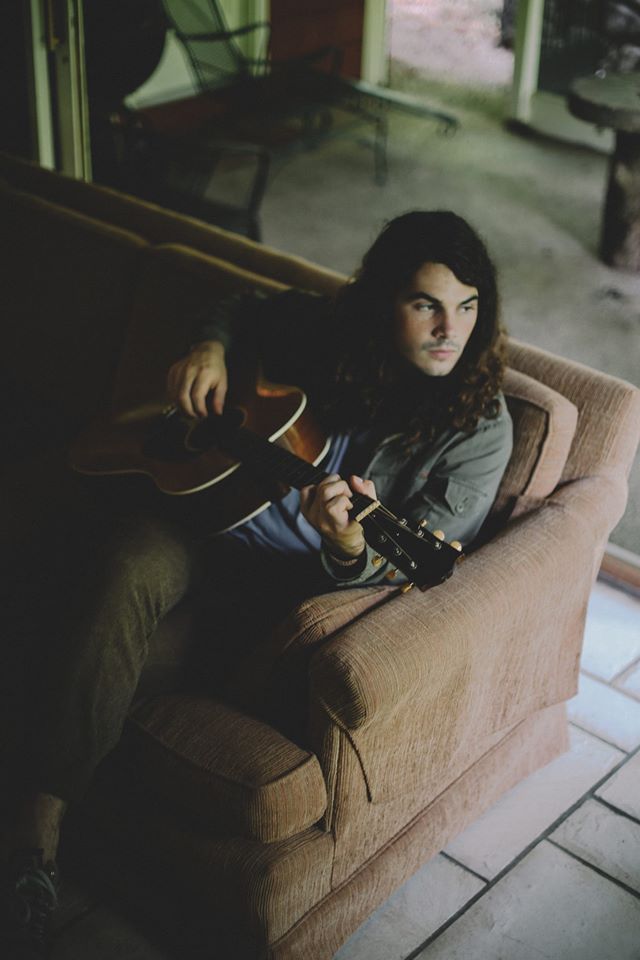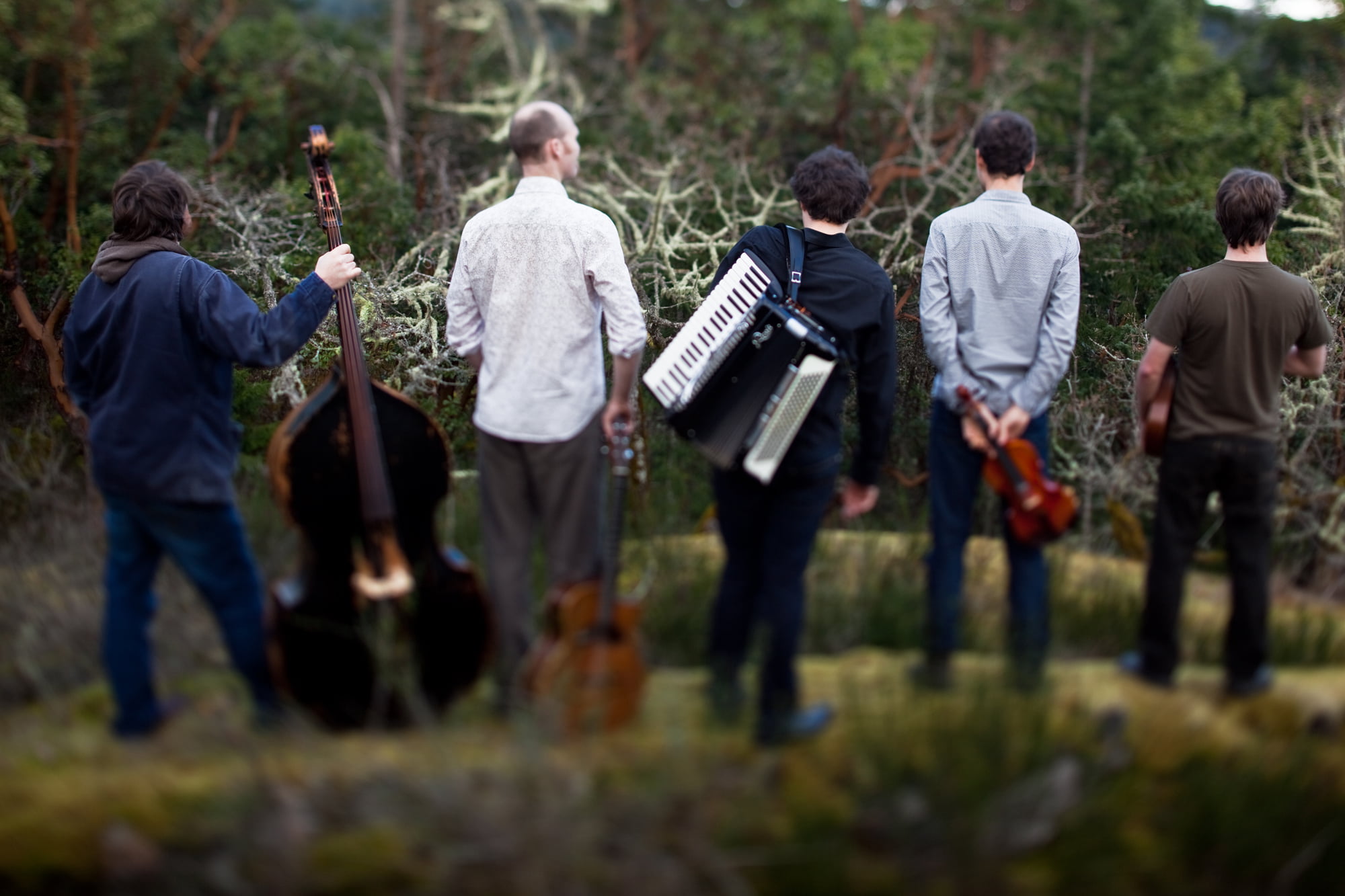In the catalog lore of Gillian Welch & David Rawlings, it’s April 14 that’s known as “Ruination Day”— the historically resonant date marking the “Black Sunday” of the Dust Bowl, the Titanic’s sinking, and the assassination of Abraham Lincoln. Themes of hard times and disaster have long floated throughout the duo’s music, but they found themselves facing catastrophe with new urgency on March 2, 2020, when a tornado laid waste to their Woodland Studios in their home city of Nashville.
That studio, which the duo took over in 2001, has the unusual distinction of being hit by three separate tornadoes over the years: it’s an unassuming icon of ruination and revival that’s withstood decades of change in personnel, technology, and weather. It became foundation and the namesake for August’s Woodland, a collection of new, original material from Welch and Rawlings after two deliciously deep archival releases and a set of covers titled All the Good Times (Are Past & Gone).
Having rescued their tapes, guitars, and other equipment from calamity, throughout 2020 Rawlings and Welch set about rebuilding Woodland around its original mid-century imprint. The creation of the record and the reconstruction of the studio became two spiritually intertwined processes, the rooms rechristened with songs that excavate the nature of change; Rawlings wrote violin, cello, and viola parts that friends laid to tape in the room he’d restored to its 1960s-era use for recording strings.
Even with the substantial building project, the extended pandemic circumstances offered ample time for writing new material together and the duo amassed dozens more tunes than they could ever release as one record. They ruminated on making a double album for a while. “We had so many songs kicking around because we didn’t want anyone to feel shortchanged if we were both singing,” Welch says.
A single-album concept instead snapped into place around “Empty Trainload of Sky,” which opens Woodland with Welch’s reflections on an unsettling optical illusion. The two tussle with loss and weariness across the record, gesturing at questions of how to keep moving through life’s seasons without hammering into any hard answers. Woodland feels like a statement of renewal and endurance from Welch and Rawlings, the sort of subtle roll forward that’s set them apart from other songwriters for so many years. The musicians spoke with BGS about their new material, old ideas, and what they still feel like they have left to do.
Prior to Woodland, the two of you had spent a lot of time working with your archival material for the Boots releases in 2020. What was the relationship you had between spending so much time working with this older material and then focusing your attention on a new record?
Gillian Welch: Not to put the Lost Songs stuff down, because I’m really happy that we, one, saved it from the tornado, and two, at that point, decided, “Why did we save this? Do we think it has value?” We decided yes, so we put it out. We haven’t given people a lot of opportunities to connect the dots between our albums. Years tend to go by, and I don’t know if they think we’re just on vacation or what, but we’re always writing. I’m happy that stuff’s in the world now.
I still stand behind our decision to not make an album out of that stuff. We’re really album-oriented artists,and if we can’t find a narrative that at least we understand, then it’s not an album. Sometimes people will put out a record and four or five years later, maybe they’re playing one song off it, maybe two. Traditionally, if we put it out, we’ll keep playing it, so we really have to like the song a lot.
So, did that archival material influence this record? Honestly? No. It just reinforced our yardstick, the filter we have in place, like, are we making a record? And the answer for all those lost songs was, “No, we’re not making a record.”
David Rawlings: We were working on some of the songs in late 2020, early 2021, but in general, they are not close in my mind. A lot of the stuff either took more final shape afterwards, or a few of the songs were kind of in shape before. But boy, working on those 50 songs was an awful lot and didn’t leave a lot of space for other things around it. It was really important, because that was one of the first things I was able to do here at the studio as I started to bring it back to life, post-tornado.
You’ve talked about having enough material to make a double album, how did you narrow everything down to the 10 songs that made the cut? What did you feel held these together?
GW: They seemed, in a way, to address the present moment. They were the most clearly about now and because of that, they seem to all fit together. Even though there’s plenty of contradiction within the album, there are these crazy undercurrents of loss, destruction, resurrection and perseverance; sadness, joy, emptiness, and fullness. It’s ripe with contrast. That’s just how we were feeling.
DR: There were different ideas, but I didn’t realize there was that large of a group, that there was the collection of 10 songs that felt like they amplified each other. I think all of the records that we’ve made that feel the best to me, one song sort of affects the way you think of the next and the whole album has a feeling that you’re not going to get if you just listen to your three favorites. I think that that feeling is heavier, or better. That, to me, is the benchmark of what you’re aiming for when you’re trying to make a record. One hopes that these other songs – one that you love for this reason, or that reason – that they eventually fall into some group like that. Or maybe we just start putting out singles.
Gillian, to what extent did everything you went through with the tornado recovery change your relationship with the natural world?
GW: I’m not sure that it did. I’ve always been really comfortable with the fact that there are things larger than us that are out of our control. It’s always sort of been a great relief to me, because I try so hard to navigate and control the things I can. Dave and I are such perfectionists. I don’t know how else to put it, except that it’s a great relief to just give it up for the things that are completely beyond your control. So I don’t worry about it really. The weather is going to be what it’s going to be. Woodland’s been hit by three tornadoes. Every tornado that’s come through Nashville has hit Woodland, but it’s still there. So I think I’m just not going to worry about it.
How do you feel like you both still challenge each other?
DR: Well, I think it’s the same as it ever was. If there’s something that doesn’t hit one of us right about something we’ve written or played, we will eventually come into agreement about that. I think we have a kind of way of taking what the other does, seeing what’s good about it and what isn’t. And that kind of ping ponging back and forth with thoughts, ideas, structures, and everything is what leads us to the stuff that we end up liking the best, and, more importantly, that other people respond to the most.
GW: I think we’re both still completely committed to trying to write better songs. It’s really interesting, because decades go by –we’ve played so many shows, and your voice changes. It just happens with the miles and it doesn’t have to be for the worst. There are things we can do now that we couldn’t do when we were kids, and certainly there are things that we can’t do now that we did in our early 20s. But I’m just so glad that there’s still a lot to explore. Musically, topically – I definitely don’t feel stale or tired of this. I feel like we both have a crazy sense of adventure.
What are some of those things that you feel like you can do now that you couldn’t do when you were younger artists?
GW: I feel like I’m able to listen while we play now, in a more elevated way. I can both listen to the smallest nuances of what I’m playing and singing and I can listen to what Dave’s playing and singing. I can make all these micro-adjustments to our four instruments, but at the same time, I can hear the sum of what we’re doing. I can also just listen to the whole sound and adjust for the whole thing. I’m not sure I used to be able to do that, or it didn’t occur to me to do it.
It sounds like a mixing board of the mind.
GW: Yeah, it’s like that! There are things that I admire so much in other musicians and sometimes I can see little echoes of that stuff that I like in our music, that we’re now able to do.
Whatever happens, at the end of the day, Dave and I are always pretty confident in, “Well, we did our best.” We really don’t slack off. If we missed the mark, whatever. You’ve just got to say, “We really tried.” It’s very exciting to feel like we’re getting closer to the music that inspired us to do this in the first place. We have a couple songs that I know came from my deep love of Jerry Garcia’s music and the Grateful Dead.
Sometimes, when we’re sitting playing in the living room, we’ll hit a passage and I’ll think, “Oh boy, Jerry really would have liked that.” That’s a good feeling, and that’s always been a great motivator – to try to do stuff that you think your idols would approve of. “Barroom Girls” got written because I thought Townes [Van Zandt] would like it. He was showing up at our gigs and stuff, and so I wanted to write a song that I thought Townes would like.
David, when Nashville Obsolete came out, you talked about this idea of keeping a place for old ways of doing things when the rest of the world has kind of pushed them aside. The last few years have had so much change, so fast – how has that idea developed for you?
DR: All of this equipment [in Woodland], almost none of it is new. It’s all the same stuff. It’s taking it a step further and maybe optimizing it for our own purposes. We’re still cutting on two-inch tape, mixing to quarter inch tape, and going through all analog equipment. The final step of going digital is the very last thing that happens. It’s not a museum, in the sense that I use a computer system – we’ve designed a bunch of DTMF code and different relays and stuff to run a lot of the equipment that we’re using. I will use modern technology in any way that I can that doesn’t touch the audio, in order to have things reset to where they are, or to have the lacquers cut with a particular precision. I will design whatever I need to in that department.
So, the goal is never for it to be a museum. The goal is always, how can you make the best sounding art? How can you do any of the stuff as well as you can? It feels the same with songwriting and music. There are modern songs that I admire so much, that you look and go, “How is that put together?” There’s stuff that goes back to the dawn of recorded music, from the late ’20s and ’30s that I think the same thing of. You just look around and cast your net at what moves you and what touches you, and then try to use those things as a jumping off place to contribute yourself.
At this point in your career, what do you still want to do that you haven’t gotten to do yet?
GW: I could say something quippy, like I still want to write a song as good as “Me and Bobby McGee” or “Like a Rolling Stone” or “Blue Eyes Crying In the Rain.” I still want to write a song that people will be singing for a long time. I still keep trying to do good work. Each song that we write is something that hasn’t existed before. So each time we start a song, I want to fulfill that inspiration.
So, you know, it’s like breadcrumbs— “Oh, I haven’t done that,” and you take another little step forward. Where will it ultimately lead? I have no idea. I’m sort of inching forward. Dave and I have never really had a grand plan. We just keep wanting to make music, so that’s what we do.
DR: I just always think that I want to get good at this. I really love the process of writing and performing in front of people, and have since the very first time I was able to get up on stage and play guitar. That was winning the lottery. When we started writing our own material and having people respond to it, there’s nothing really better. It’s a question of longevity, how long can we keep doing things and keep thinking of things that people feel are meaningful in their lives? How long can we stay relevant?
I don’t think that I’ll ever have a feeling of arrival. It’s all pushing forward. How can I play guitar better? How can we write better songs? How can I sing better? How can we record things better? It’s the learning that’s fun, it’s not even necessarily about getting better. It’s about wanting to explore and the pleasure in that process and the doing of it. I’m not real goal-oriented, there’s never been a statue I wanted to win. We’ve gotten some lifetime achievement awards over the past few years, and I’m like, “Are you kidding? We’re just starting to do this! I don’t know what you’re talking about!” It’s not memoir time, and it never will be.
Photo Credit: Alysse Gafkjen



